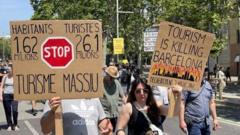After a militant attack resulted in devastating losses in Pahalgam, the once-bustling tourist town is beginning to see visitors return, yet uncertainty and fear loom large as the security situation remains tense. Business owners hope for recovery as they navigate the challenges posed by the incident.
Resilience in Pahalgam: Tourists Return Amid Tensions and Tragedy

Resilience in Pahalgam: Tourists Return Amid Tensions and Tragedy
Following a tragic attack, Pahalgam sees a slow revival of tourism as visitors cautiously return, grappling with rising tensions and fears.
In the aftermath of a militant attack that resulted in the loss of 26 lives near the picturesque resort town of Pahalgam in Indian-administered Kashmir, the area has been shrouded in a quiet desolation. However, despite the tragedy, a trickle of tourists are slowly making their way back to the town, which had been deserted just a week prior. Shops that were once shuttered are beginning to open, and hotels are seeing a few guests again.
The attack took place when militants opened fire on tourists at Baisaran, a popular hilltop meadow close to Pahalgam. This incident marked one of the deadliest assaults in the region in recent years, igniting anger and despair across India. Escalating tensions have been observed between India and Pakistan over the Kashmir region, with retaliatory measures announced by both nations. In response to the incident, the local government has temporarily closed more than half of the valley's tourist destinations while security assessments are conducted.
The tourism sector is vital to Pahalgam's economy, and community members fear that the long-term impact of the attack could jeopardize their livelihoods. Although some tourists express concerns about safety, many are choosing to stay due to expensive flight options. Akshay Solanki, a visitor from Mumbai, described the panic his group felt but highlighted the local residents' reassurances as a source of comfort. Shawl seller Rafi Ahmed lamented on the decline in sales post-attack, fearing a decrease in tourism would spell disaster for local businesses.
Support for the region's tourism recovery has also emerged from Bollywood actors, including Atul Kulkarni, who publicly urged individuals to visit Pahalgam as a form of resistance against the militants' agenda of fear. "Don't cancel bookings," he implored, emphasizing the community's need for tourists to stand by them.
Despite these efforts, uncertainty pervades. Many travel plans have been cancelled, with reports indicating that 80-90% of bookings from major cities have been affected. Abhishek Sansare, a Mumbai tour operator, explained that the notion of an impending conflict has left potential tourists feeling confused about their travel decisions.
In addition to the chilling impact on immediate tourism, the attack may hinder future developments, such as the delayed inauguration of a significant rail bridge intended to connect Kashmir with the rest of India. Local business leaders express concern that investments in the region might stall as safety worries prevail.
With tremendous sorrow, the local government reflects on the weight of the tragedy. Chief Minister Omar Abdullah provided tributes in the Jammu and Kashmir assembly, acknowledging the deep emotional toll inflicted on families affected by the violence and expressing regret for the disruption to the cherished experience of visiting Kashmir.
As Pahalgam begins the long road to recovery, the community remains tethered to hope, while grappling with the underlying fear that shadows this beautiful region.





















